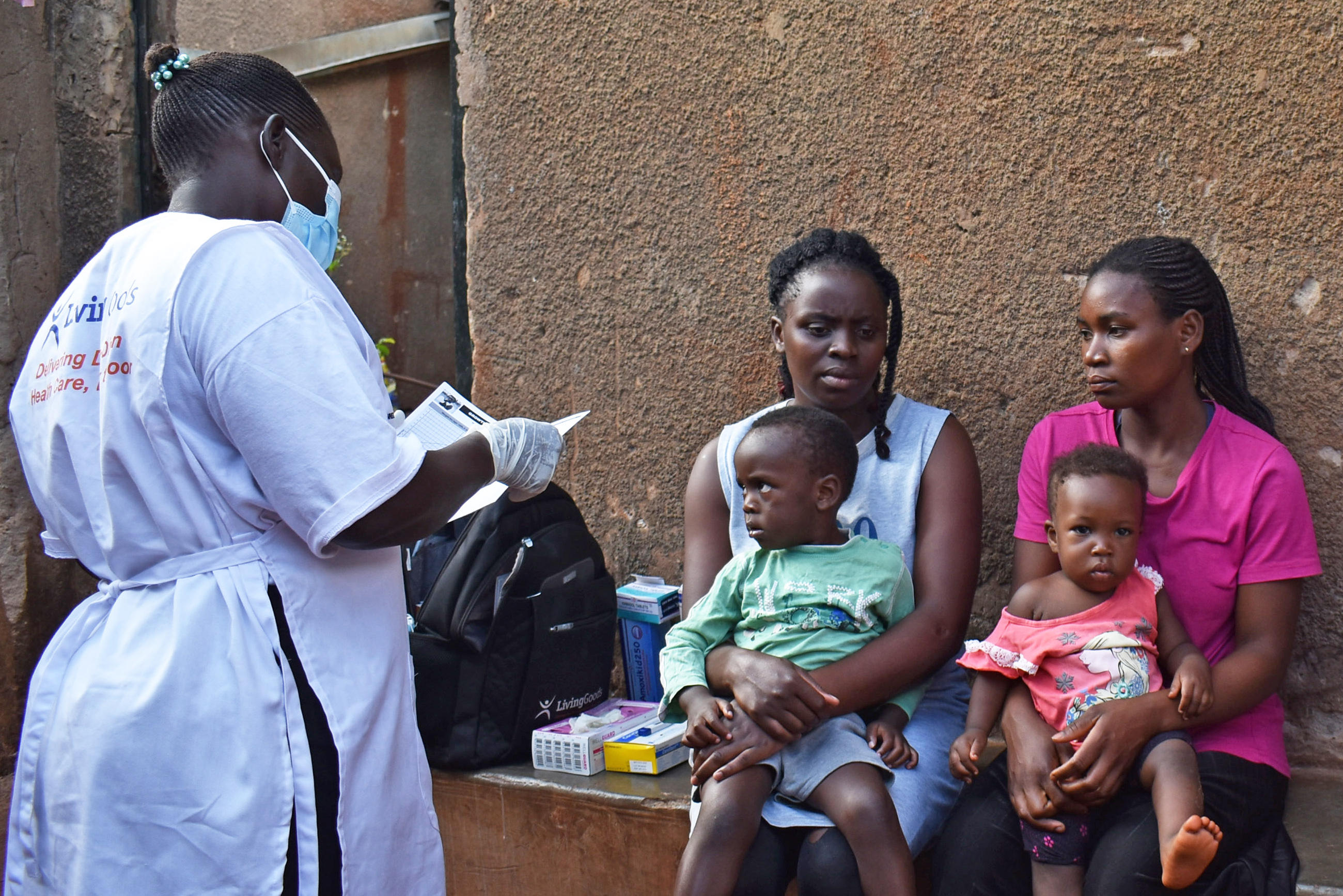Why Are Community Health Workers Key for a Healthy Future for All?

Grace Adong is a community health worker serving more than 350 households in Uganda. Photo by Living Goods.
On December 12 we celebrate International Universal Health Coverage (UHC) Day. UHC cannot be achieved without strong and sustainable community health systems staffed by community health workers (CHWs) like Grace Adong. Grace works in Mbuya, Uganda, a suburb of the capital city Kampala. She has worked as a CHW with support from Living Goods for more than five years, serving 350 households a month with primary health care services that are the foundation of UHC.
Sauya Nassejje, a community health supervisor at Living Goods, met with Grace to ask her views on UHC, community health, and what she needs to maximize her impact.
Universal health coverage means everyone, everywhere has access to affordable and high-quality health services. Why do you think it is important that Uganda works toward this goal?
Universal health coverage will enable Ugandans to live healthy and long lives due to increased accessibility and affordability of health care. It will help to reduce the mortality rates of children and adults as they will be getting higher quality health care. I believe UHC will have impact in my country beyond just health outcomes. If everyone has access to health care, both the community and the country will be more productive, which will in turn lead to improved standards of living and development of my community and of the country at large. It will enable the country to save the money that would have been spent on treatment to build better infrastructure like schools and roads.
The theme of UHC Day this year is "A Healthy Future for All." What do you think a healthy future for all will look like in your community and elsewhere?
A healthy future will be a future where everyone regardless of their economic status, religion, or residence will be healthy and wealthy due to the availability, accessibility, and affordability of health care. It will be a future where people will have money to enable them to meet their daily basic needs like food, transport, shelter, water, and education.
I think about a mother I recently helped to access life-saving care. She had given birth prematurely and started bleeding unexpectedly. She called me, scared, and I found her soaked in blood. Her husband was not home. I wrote her a referral and immediately got her transport to the emergency room. The hospital needed some money before they could treat her, but she didn’t have it. It took a long time before they could attend to her, as they waited for her husband to send the money. The mother survived and is fine now, but I look forward to a time when our health facilities can treat people without having to ask for—and delay care for—any money.

Grace Adong visits patients in Mbuya, Uganda, a suburb of the country’s capital city Kampala. Photo by Living Goods.
Why do you think your role as a community health worker is important to providing a healthy future for all?
My role as a CHW is important to providing a healthy future for all because I move health care services close to my people through door-to-door service delivery. In my work, I help to reduce infant and child mortality through timely assessments, diagnoses, and treatments. I also support mothers through pregnancy registration, health education, case referrals, antenatal visit reminders, on time follow ups, and post-partum visit assessments. I believe my role helps to save time that people spend at health facilities thus enabling them to work and meet other basic needs. It helps people to save on transport costs and reduces congestion at health facilities.
Further, CHWs create awareness about disease outbreaks to the ministry of health and the government. During the pandemic we conducted health education and sensitization meetings to encourage communities take the recommended actions to prevent COVID-19. Even now, we go around sharing information to dispel misinformation and misconceptions about COVID-19 vaccines and other infectious diseases. Some people were hesitant to get vaccinated because they didn’t trust the safety of the vaccines. We led the way by getting vaccinated first before influencing them. With the Ebola outbreak in my country, I’m also participating in disease surveillance activities.
If you could ask the leaders in Uganda for one thing to help with your job, what would you ask for?
I would ask for community health workers like me to be paid. I would also ask for recognition, including a workplace identity card baring my name and position. My job is important to the national health system and should be acknowledged as so.
As a community health worker—more commonly known as a Village Health Team (VHT) member in Uganda—Grace is considered a volunteer and does not receive a salary. She receives a small stipend and performance-based incentives from Living Goods. Living Goods believes all CHWs should be compensated consistently and advocates for such at the national, regional and international levels. The Ugandan government is currently considering new policy that would guide payment for VHTs like Grace going forward. Living Goods is a member of the Frontline Health Workers Coalition.
